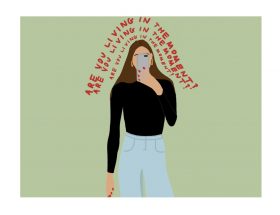CW: Mentions of sexual assault, violence
I hate calling myself a “citizen of the world.” It sounds like something you see on those cringey posters at travel agencies or in an economics textbook that looks like it’s meant to indoctrinate you into believing capitalism and globalization are benign. It sounds… cheugy. It feels like a term that belongs in the 90s or the 2000s- far too optimistic for the jaded Generation Z within which I happen to fit. It makes me think of a printed Time Magazine issue with an ethnically ambiguous face plastered across its cover, conjuring back a time when we all thought we would be living like Zenon: Girl of the 21st Century in 2021. It feels naïve on the tongue, kitschy and flaky and meaningless- a chalky, vacant phrase to utter in this day and age.
For so many of us though- what label is truly appropriate? What fits me best when I have to sift through multiple passports when I’m at customs? Cosmopolitan? No. That’s mad cheugy too.
Our personas and core selves are constructed in a world where the idea of multiple national, cultural, and social identities is highly unfathomable. Not on the surface of course- that’s celebrated on paper, the place from which terms like “citizen of the world” and “cosmopolitan” gained attractiveness and glamor for a second in the 20th century. It remains true, however, once that surface is scratched that it is glaringly obvious that in this capitalist hellscape we are nothing without the concept of strictly defined boundaries and the impenetrable force of binary thought clinging to each and every action we carry out throughout our lives. For instance: you are not Mexican-American in the US if you have grown up with Mexican parents in a largely latinx community and are constantly in contact with Mexican culture- you are solely American. Your responsibility as an American is to erase the former part of the label and let the latinx fade into nothing- one mode of identifying is all consuming, cannibalistic and refuses to let the other exist within its space. American national identity is directly tied to whiteness, evangelical Christianity, pull-yourself-up-by-the-bootstraps Protestant work ethic- and it directly repudiates the otherness of being Latinx. One identity is constructed specifically to eclipse the other, and even the most well meaning individuals tend to forget that recognizing hybridity is the first step in healing the violent erasure of purity formulated through exclusion. Our “globalized” society is so deeply fractured, so incapable of inclusiveness that we mistake our social identities melding into one, Hyper-Western, neoliberal, rusting crucible that worships at the altar of capitalism as… progress?
Colonization is (I know, here I go again), I believe, the Pandora’s box that released upon the world this rejection of cultural hybridity- the one that built cathedrals on the ashes of Tenochtitlán using the spolia of its own temples and the slave labor of thousands of defeated indigenous individuals in 1521. It is undoubtedly at fault for an entire cultural reset based on the reprogramming (and by reprogramming I mean forcing into exogenous socioeconomic systems), brutalization, and hierarchical stratification of people of color across the world- something I witness every single day in Latin America. This colonialism I see is one that deliberately built cracks into its foundation- one that was never really about sharing space but whose starring role was played by the key ingredient of alienation. Anything that fits outside of the mold of the dominating culture in this allegedly syncretic mixture of cultural elements is deemed automatically unfit, not good enough, fundamentally lacking. It’s why so many of us have a deep-set hollowness and self-hatred caused due to our Non-Westernness that continuously aspires to be European in every way shape and form. Crazy thing is- that Europeanness associated with affluence and success would probably not be as aspirational as it is had it not so egregiously exploited the non-Western world for centuries.
Particular to this Latin American nationalism, one that superficially prides itself in its hybridity, upholds the myth of what we might call “mestizaje” within its national narratives. This benign term is what turns us into countries full of people that joined hands in a (supposedly) consensual, equally beneficial cultural exchange which resulted in the amalgamation of thousands of indigenous cultures and the Western Spanish and Portuguese modes of being. It gives us an excuse to forget the fact that Latinx nations were largely born from the barbaric raping and pillaging of an entire cultural region with its own great civilizations and sophisticated societies. It also allows us to see the domineering presence of whiteness within our own cultures as good, its own civilizing element that was a necessary evil for the vibrancy of Latin America to come about the way that it has. Whiteness is inherent to Latinx national identity, and it is what we see as a version of self-actualization and growth. Whiteness marks progress, a break with indigeneity, and a newer, better, more ethical way of living our lives- or so our Catholic guilt dictates. Our mestizaje is an excuse for the continuous erasure and exploitation of indigenous groups that struggle to survive under the chokehold of suffocating extractive trade deals that make it increasingly more difficult for them to be self-sufficient. This is all under the pretense that indigenous people’s incapacity to exist within mestizo culture (and by proxy, whiteness) is unnatural, but also oxymoronically that our proximity to indigenous ethnic heritage makes it okay for us to exploit them. We are, after all, family looking out for family.
To look back into the origins of this mythos, one must first and foremost consider Malintzín. Within the narrative myth of mestizaje, the cursed name of Malintzín, the woman who translated from Náhuatl to Spanish for the conquistador Hernán Cortés (the man who orchestrated the aforementioned shit show in Tenochtitlán) is widely spat upon but also venerated (for misogyny reasons, of course). She is both the whore who betrayed her people for the Spaniards and the benevolent mother of the first mestizos with an indigenous mother and a Mexican father. In either narrative, however, she exists as the first to give in to the irresistibility of Western supremacy voluntarily and is the reason why Latin America is the way that it is. She’s an Eve and Lilith figure melded into one, and her struggles (like those of Eve and Lilith) are horrendously underwritten and ignored. Eve and Lilith and Malintzín are where evil is said to have begun, having to have submitted to a greater male power at some point in their stories, given absolutely no sympathy and used as the reason to explain human suffering (particularly that of women). Malintzín is blamed and celebrated for a mythical submissiveness that, historically, is simply inaccurate.
Malintzín did not submit, at any given point, to Hernán Cortés, be it physically or sexually. She was not a temptress or a snake- she did not willingly cause the destruction of entire civilizations as much as she was forced, threatened, and sexually assaulted at the hands of strange, powerful men that made her do their dirty work. She is not the reason for the cracks in the foundation of mestizaje- the fact that she was raped and coerced is. We all know, she is not in any measure to blame for that rape and coercion- it was those that forcibly carried out her personal nightmares upon her mind and body, it was the colonizers that degraded her and continue to spread myths about her that are to claim culpability. She did not strive away from her indigenousness and towards whiteness- Hernán Cortés did. The mestizaje that resulted from her womb did not come from a consensual attraction between two individuals that consequently created a culture that was benignly hybrid- it was the product of violence. The myths surrounding this mestizaje are the reason for the perpetration of this violence to date. More importantly, this forcible mestizaje is the fundamental reason why we, as a society, are incapable of dealing with the problem of difference. There is no acknowledgement of the suffering behind “difference” or behind power hierarchies within self identity- the ingrained incapacity to coexist that colonialist modes of being have normalized so thoroughly as part of our existence.
Healing this gap, this incessant aspiration towards singularity and “citizen of the world” mentality obligates us to always consider Malintzín. Her suffering might not serve as a universal descriptor for the pain that intolerance and exclusionary societies have generated to billions- but recognizing it might be a step in the necessary direction.
Art by Sophie Dickson






